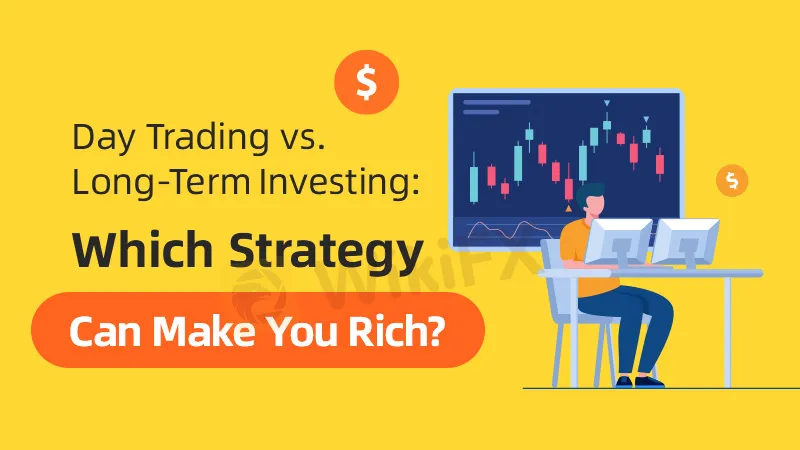简体中文
繁體中文
English
Pусский
日本語
ภาษาไทย
Tiếng Việt
Bahasa Indonesia
Español
हिन्दी
Filippiiniläinen
Français
Deutsch
Português
Türkçe
한국어
العربية
Day Trading vs. Long-Term Investing: Which Strategy Can Make You Rich?
Abstract:When it comes to building wealth in the financial markets, two popular strategies often stand at the forefront: day trading and long-term investing. But which strategy truly has the potential to make you a millionaire?

When it comes to building wealth in the financial markets, two popular strategies often stand at the forefront: day trading and long-term investing. Each approach offers unique benefits and challenges, and choosing the right one for your financial goals could be the key to unlocking millionaire status. But which strategy truly has the potential to make you a millionaire? Let's break down the pros and cons of each to help you make an informed decision.

Day trading involves buying and selling financial instruments, such as stocks, currencies, or commodities, within a single trading day. The goal is to capitalize on small price movements to make a profit. Day traders typically use technical analysis, charts, and other tools to identify short-term trading opportunities.
One of the main advantages of day trading is the potential for quick profits. Successful traders can generate substantial returns in a short period, with gains that can accumulate over time. Additionally, day traders avoid the risks associated with holding assets overnight, such as market gaps or unexpected news events, since all positions are closed by the end of the trading day. This strategy also allows traders to have full control over their trades, enabling them to adjust their strategies in real time and respond dynamically to market movements.
However, day trading is not without its challenges. The fast-paced nature of this strategy makes it inherently risky, with losses potentially accumulating as quickly as gains, especially for those without a well-defined strategy. The emotional stress of day trading can also be significant, as it requires a high level of discipline, focus, and mental fortitude to manage the constant demands of the markets. Moreover, day trading is time-consuming, requiring traders to monitor the markets closely throughout the trading day, which can be challenging for those with other commitments or limited time.

Long-term investing, on the other hand, involves buying and holding assets—such as stocks, bonds, or mutual funds—for an extended period, often years or even decades. The strategy is rooted in the belief that, over time, the markets tend to grow, leading to capital appreciation.
One of the primary advantages of long-term investing is the power of compounding. By reinvesting gains, investors can generate more earnings over time, leading to exponential growth. This approach also tends to be less stressful than day trading, as it requires less frequent monitoring of the markets, allowing investors to avoid the emotional strain associated with daily trading activities. Long-term investors may also benefit from tax advantages, such as lower capital gains taxes compared to short-term traders, depending on their jurisdiction. Additionally, long-term investors can build a diversified portfolio across various asset classes, reducing overall risk and enhancing the potential for steady returns.
However, long-term investing also comes with its challenges. Patience is required, as it may take years to see significant returns, and market downturns can test even the most seasoned investors' resolve. There is always the risk of extended bear markets, economic downturns, or sector-specific challenges that can impact returns. Furthermore, long-term investors may feel less in control of their portfolios since they are less likely to make frequent adjustments based on short-term market movements.

The answer to this question largely depends on your risk tolerance, time commitment, and financial goals. If you have a high risk tolerance, enjoy the thrill of the markets, and are willing to dedicate significant time and effort to developing a winning strategy, day trading could offer the potential for rapid wealth accumulation. However, it is important to remember that the risks are equally high, and many day traders struggle to consistently make a profit.
For those who prefer a more patient and steady approach, long-term investing may be the better path to millionaire status. While the gains may be slower, the power of compounding and the historical growth of markets can lead to substantial wealth over time with fewer emotional ups and downs.
Both day trading and long-term investing have the potential to make you a millionaire, but the journey will look different depending on the path you choose. Day trading offers the allure of quick profits but comes with significant risks and demands. Long-term investing requires patience but leverages time and compounding to build wealth steadily.
Ultimately, the best strategy is the one that aligns with your personality, lifestyle, and financial goals. Whether you're drawn to the fast-paced world of day trading or the disciplined, steady approach of long-term investing, success will depend on your ability to stick to your plan, manage risks, and continuously educate yourself about the markets.

Disclaimer:
The views in this article only represent the author's personal views, and do not constitute investment advice on this platform. This platform does not guarantee the accuracy, completeness and timeliness of the information in the article, and will not be liable for any loss caused by the use of or reliance on the information in the article.
Read more

Italian Regulator Warns Against 5 Websites
The Italian regulator, CONSOB has issued a warning against five websites offering unauthorized financial services. This regulatory action aims to protect the public from fraudulent activities.

What Makes Cross-Border Payments Easier Than Ever?
Cross-border payments are now faster, cheaper, and simpler! Explore fintech, blockchain, and smart solutions to overcome costs, delays, and global payment hurdles.

Broker Review: What is FXTM exactly? Is FXTM a Scam?
FXTM is a global forex broker founded in 2011. In today’s article, we are going to show you what FXTM looks like in 2024.

Many Social Media 'Investment Gurus' Are Scammers Preying on Malaysian Traders
Social media platforms have become breeding grounds for scammers posing as investment gurus, exploiting the growing interest in forex and cryptocurrency trading among Malaysians. Fraudulent "financial experts" often create the illusion of legitimacy by offering enticing stock analyses and promises of high returns.
WikiFX Broker
Latest News
Hackers Charged for $11M Crypto Theft Using SIM-Swaps
Role of Central Banks in the FX Market
FCA Alerts Against Sydney FX
What Makes Cross-Border Payments Easier Than Ever?
Trader Exposes Unethical Practices by STP Trading
Bitcoin Nears $100,000: A Triumph of Optimism or a Warning Sign?
Malaysian Man Loses RM113,000 in Foreign Currency Investment Scam
Mastercard Partners with JPMorgan for B2B Cross-Border Payments
FCA Identifies Clone Firm Exploiting Admiral Markets' Credibility
Coinbase Under Scrutiny Amid Wrapped Bitcoin Delisting Controversy
Currency Calculator


